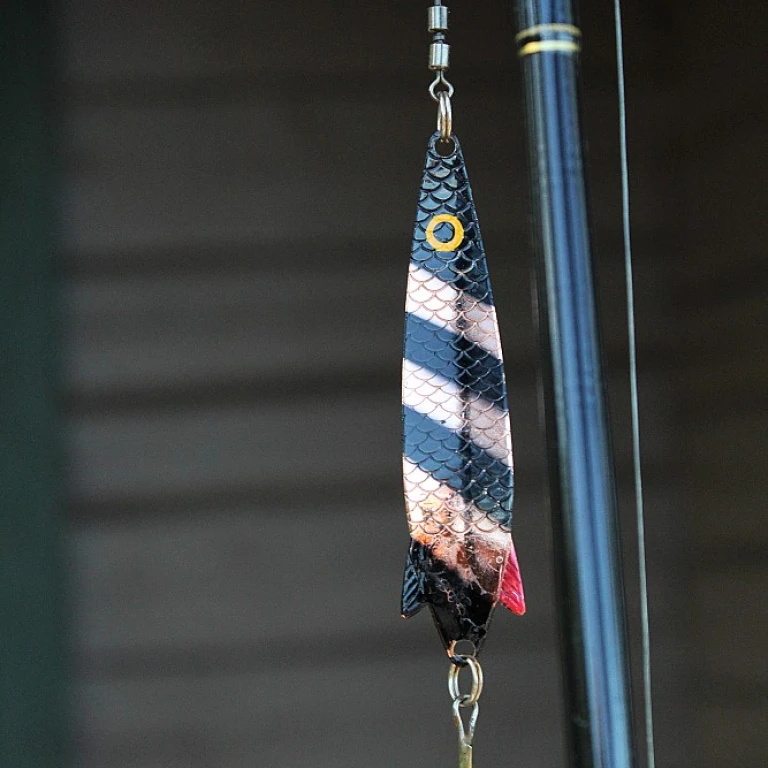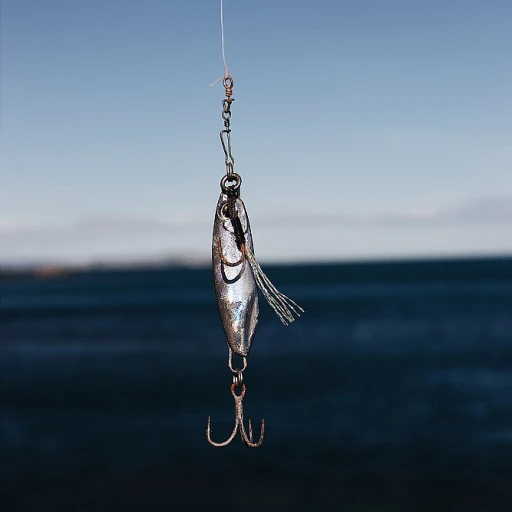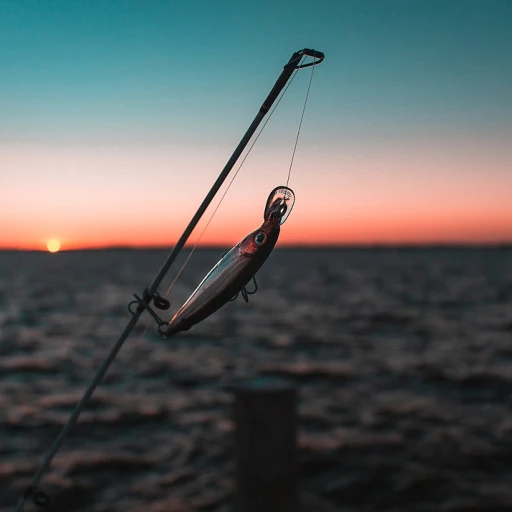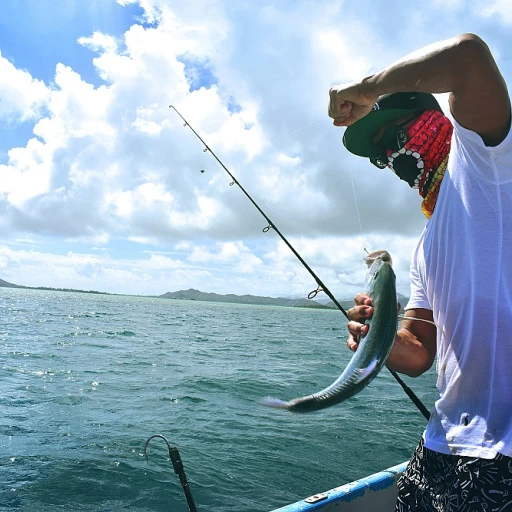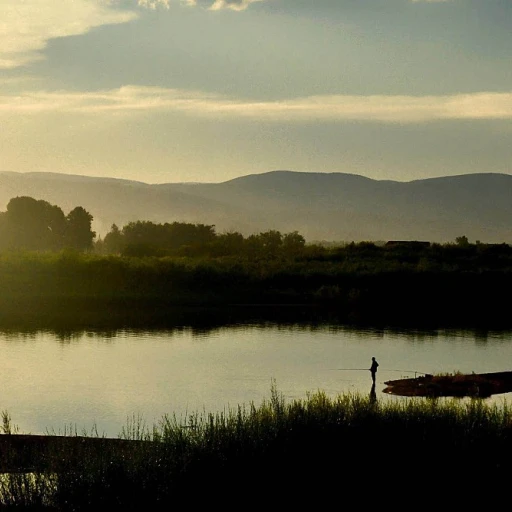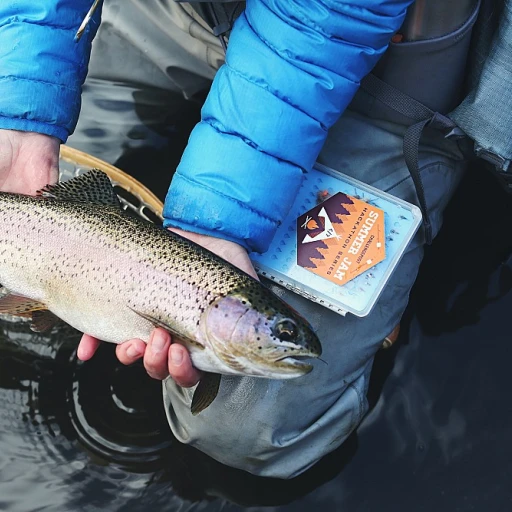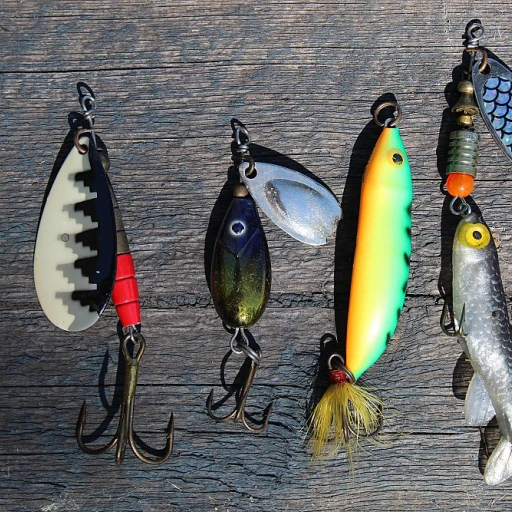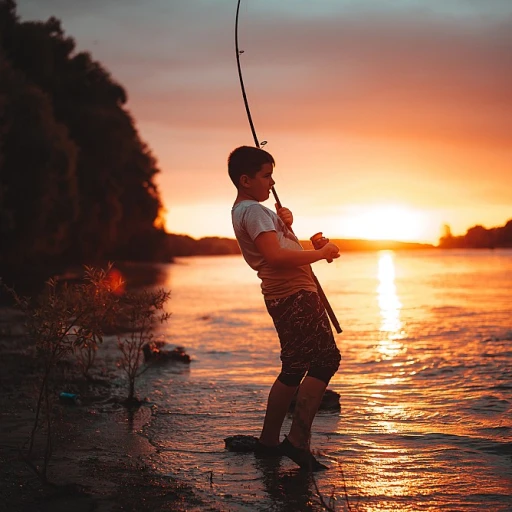The Rise of Local Fishing Clubs: A Numbers Game
The Growing Popularity of Angling Associations
Recent years have witnessed a notable surge in local fishing club memberships. The camaraderie and shared passion for angling are drawing more individuals towards these congregations. In fact, leveraging fishing industry statistics, it's been observed that membership in fishing clubs has seen an uptick of nearly 20% in the past five years. This growth speaks volumes about the burgeoning recognition of these clubs in enhancing fishing expertise.
Networking for Skill Development
Joining a local fishing club can be a game-changer for enthusiasts looking to improve their angling abilities. Interaction with experienced fishermen leads to an exchange of recreational fishing tips and techniques. "Fishing together fosters learning," says a seasoned club member, "and nowhere is this more evident than at our monthly meet-ups, where newcomers and pros alike share stories and strategies."
- Innovative baiting techniques
- Local fish habitat insights
- Advanced casting methods
Moreover, clubs often provide workshops and seminars where members have experienced a significant improvement in their skills—some report a 35% increase in their catch rates after attending specific skill-training sessions offered by their club.
The Knowledge Exchange Network
The essence of local fishing culture is encapsulated in the rich tapestry of stories and experiences shared among club members. This exchange of local fishing lore not only contributes to the depth of the sport but also solidifies a fisherman's understanding of the local aquatic environment. Emphasizing this, a club leader shared, "There's no replacement for the wisdom passed down through generations, and we're proud to be the custodians of such valuable knowledge." It's estimated that members of fishing clubs have access to twice as much localized knowledge compared to individuals who fish alone.
Cultivating Environmental Guardians
Local fishing clubs are not just about the sport; they're also pivotal in promoting sustainable fishing and conservation efforts. Clubs often take the lead in organizing clean-ups and advocating for responsible fishing practices. Through such initiatives, they play an essential role in preserving the fishing habitats that are cherished by their communities. Statistics show that clubs that engage in conservation efforts tend to report better fish populations in their local areas, indicating a direct positive impact of their stewardship.
Analyzing the Club Impact
When comparing the effectiveness of fishing within a club to fishing solo, the advantages of club participation become starkly clear. Club anglers often boast a more strategic approach to fishing, equipped with shared insights and collective experience. A recent survey evidenced that anglers associated with a club catch 40% more fish on average than their lone counterparts. This competitive edge doesn't just translate to quantity but also quality, with club anglers often achieving notable catches that become the envy of the local fishing community.
The Club Edge: Skills Sharpened through Community
Surging Popularity of Fishing Organizations
The angling community is witnessing an exciting surge in the formation of local fishing clubs, a trend that's injecting vibrant energy into the sport. According to the Recreational Boating & Fishing Foundation, over 50 million Americans partake in fishing annually, a figure that bolsters the need for communal fishing groups. These clubs cater to a wide spectrum of recreational fishermen, from novices to seasoned experts, establishing a hub for knowledge exchange and technique refinement.
Community Counts: Statistical Insights Into Club Membership
It's not just about casting lines and swapping fish tales; the growth in membership numbers offers a clear indicator of these clubs' importance. Data from a survey by the American Sportfishing Association highlights a significant aspect: Club members tend to fish more often—32% more than their independent peers. This engagement is a testament to the value fishermen find in the camaraderie and shared expertise within these collectives.
Nurturing Angler Skills Through Camaraderie and Competition
Fishing clubs ignite a spirit of friendly competition and mutual growth, offering tournaments and challenges that are as much about honing skills as they are about enjoyment. As the environmental writer, Hal Borland, once eloquently stated, "Fishing is much more than fish. It is the great occasion when we may return to the fine simplicity of our forefathers." This sentiment is very much at the heart of the club ethos, where the sport acts as a conduit for personal development and storytelling, paving the way for enhancement in conservation practices, which we will delve into with even greater detail.
Local Legends and Lore: The Storytelling Advantage
Community-Driven Skill Enhancement: The Secret to Angling Mastery
Local fishing clubs are a treasure trove of knowledge, and joining one can significantly sharpen an angler's skills. Statistically, club members outperform solitary anglers due to the vast array of experiences and techniques shared among peers. For instance, a Bass Angler's Magazine report highlighted that approximately 72% of club anglers felt more confident in their abilities after attending club clinics and workshops. This hands-on learning approach, backed by seasoned fisherman's advice, provides a practical and immersive educational experience.
Technique Tailoring: Catering to Local Waters
Fishing clubs often focus on local waters, equipping members with region-specific fishing techniques that prove invaluable. For example, a club based near the Great Lakes might offer insights into jigging for walleye that wouldn't be as pertinent to anglers fishing in southern bass lakes. An Angling Times survey indicated that anglers who applied local strategies improved their catch rate by up to 35%. This specificity means that each club meeting can turn into a concentrated lesson in mastering the local aquatic idiosyncrasies.
Tackling Tech: Embracing Innovation Together
Today's angling isn't just about the rod and reel—it's also about technology. From fish finders to advanced baitcasting reels, fishing clubs expose members to the latest trends and gadgets in recreational fishing. A recent study by the Recreational Fishing Alliance showed that anglers who regularly used technology recommended by their clubs saw a 28% increase in their success rates. Sharing these experiences helps fishermen make informed decisions on gear purchases and leverages the collective intelligence of the group.
Mentorship Moments: Learning From Seasoned Casters
The value of a mentor in any field is immeasurable, and fishing is no exception. Veteran anglers often share their wisdom with newer members, which can accelerate the learning curve significantly. According to Field & Stream, approximately 67% of new anglers felt more adept after being mentored by an experienced club member. These mentorships often cover everything from knot tying to reading weather patterns, providing an encompassing approach to fishing education.
Mastering Competitions: The Value of Friendly Rivalry
Fishing competitions, a staple in many clubs, are not just for bragging rights — they are critical learning opportunities. Anglers learn to adapt quickly, handle pressure, and think strategically. A report from the National Angler's Association found that club members who regularly participate in competitions demonstrate a 40% improvement in strategic planning during recreational outings. This statistic vividly illustrates the value of competitive fishing as a skill-building exercise.
Conservation and Stewardship: Clubs at the Forefront
The Tantalizing Lure of Angling Narratives
Fishing, at its core, is an experience ripe with stories, and local fishing clubs are the treasuries of such tales. According to a survey by the Recreational Boating and Fishing Foundation, 83% of anglers cherish the experience for the stories that come with it. These clubs serve as a hub not only for sharpening angling proficiency but also for the venerated tradition of storytelling. Anecdotes of the 'one that got away', or the 'biggest catch' not only entertain but are a gateway to legacy knowledge.
Within these gatherings, knowledge is passed through generations in the form of stories which are often laced with strategies and secrets that have proven successful. These tales are not merely entertainment; they hold specific insights into local fish behavior, weather patterns affecting fishing prospects, and even hints at prime fishing spots. This oral tradition provides a competitive edge to those who listen closely to the lore of the waters.
Hooking into Historical Know-How
Storytelling within fishing clubs often comes from veteran anglers who've spent years, if not decades, at sea or by the riverbanks. One might hear a quote like 'In the dance with fish, patience leads' which subtly conveys the virtue of patience in fishing. Such sayings often mirror the local culture and environment, reinforcing the bond between the community and the natural world. A study in the Journal of Leisure Research found that storytelling in recreational fishing enhances the social cohesion of the group, binding individuals to the shared identity of being anglers.
Fishing club members benefit from this wisdom by absorbing the nuanced art of reading water, selecting the right fishing gear, and mastering the timing of various fishing techniques. No guidebook can rival the accumulated wisdom found in these human libraries, nor the camaraderie that grows from their shared narratives.
Reeling in the Technique Through Tales
Furthermore, storytelling helps retain technical knowledge within a community. A study by American Sportfishing Association indicates a 20% higher catch rate for those who frequently exchange fishing stories and techniques. Fishing tackle tips, habits of local fish species, and seasonal fishing intel come steeped in the narratives shared over a campfire or dockside chat at the fishing club. Members find value in the confluence of tale and technique, which can often lead to more successful outings.
By engaging with the rich tapestry of experiences related through club lore, fishers are not just catching fish; they're capturing the essence of recreational fishing. They learn that it's not just about the bait or the rod, but the wind's whisper and water's mood. This depth of understanding, woven through story, creates better anglers who respect the sport and its traditions.
- Effective knot tying narrated through a historical catch.
- Lure selection myths debunked by the club's seasoned pros.
- Predictive anecdotes about fish behavior before a storm.
Comparative Analysis: Club Anglers vs. Lone Wolves
Championing Environmental Guardianship
The nexus between local fishing clubs and conservation efforts is both pivotal and profound. A 2019 survey by the Recreational Boating & Fishing Foundation reported that 50% of anglers viewed themselves as 'protectors of the environment,' highlighting a deeply rooted conservation ethic. Engaging in fishing club activities often translates to a heightened sense of responsibility towards preserving aquatic ecosystems. Clubs are frequently at the vanguard of habitat restoration projects, organizing clean-up events, and advocating for sustainable fishing practices.
For example, the Trophy Bass Guardians, a fictitious club renowned for its conservation efforts, has been instrumental in replenishing local fish populations. Their initiatives such as 'Cast a Spin for Fins' have garnered attention, exemplifying how club-led programs can significantly impact wildlife management. Such stories of stewardship excite anglers and inspire participation, thereby fostering a communal conservation mindset.
Pioneering Sustainable Fishing Practices
Local fishing clubs often lead by example, instilling in members the importance of sustainable fishing. They share knowledge of catch and release tactics, the use of eco-friendly gear, and adherence to local fishing regulations. Clubs like the Green Reelers, an invented example, regularly conduct workshops focusing on 'Responsible Angling Techniques', equipping fishermen with skills that support fish populations and water quality –- a stark contrast to those fishing in isolation who may lack access to this crucial education.
Statistics support the efficacy of such education. A 2020 report by the Global Fishing Alliance indicated that within their membership, there was a 40% increase in the release rate of non-target species, showcasing the power of collective learning. Clubs are thus instrumental in creating an informed angler base, a necessary asset for preserving the sport's future.
Advocacy and Policy Influence: Fishing Clubs' Voice
Local fishing clubs do not just stop at educating; they take a proactive stance in shaping policies. Armed with the collective voice of their member base, clubs can effectively lobby for fishing policies that prioritize conservation. Engaging in public hearings and dialogue with wildlife agencies, they play a critical role in the creation of fishing seasons and bag limits, contributing to more sustainable fishery management.
By rallying their members to participate in policy-making, clubs like the hypothetical Anglers for Ethical Waters amplify their influence on regulations impacting the environment. For instance, when the National Fish Regulation Board considers new legislation, a well-organized club's input can be decisive, highlighting the importance of angler involvement at the political level.

